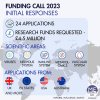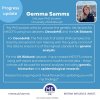Andy
Senior Member (Voting rights)
Funding announcement.
Cause-effect relationships in the mitochondrial energy inefficiency in ME/CFS
"We are very pleased to announce that ME Research UK has made a new award for PhD-level research. This project is being conducted at La Trobe University in Melbourne, Australia by PhD student Tina Katsaros under the supervision of Dr Sarah Annesley."
https://www.meresearch.org.uk/research/cause-effect-relationships/
Cause-effect relationships in the mitochondrial energy inefficiency in ME/CFS
"We are very pleased to announce that ME Research UK has made a new award for PhD-level research. This project is being conducted at La Trobe University in Melbourne, Australia by PhD student Tina Katsaros under the supervision of Dr Sarah Annesley."
https://www.meresearch.org.uk/research/cause-effect-relationships/


